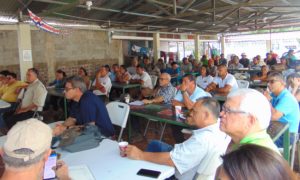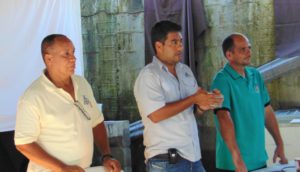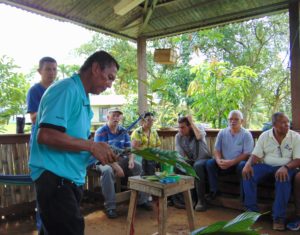EARTH-led platform advises Costa Rican cacao farmers
Cacao – chocolate’s building block – boasts a rich agricultural legacy in Costa Rica, wielding enormous cultural and economic influence. Sourced from deep within lush equatorial forests, the crop is celebrated for its environmental benefits. Its leaves, for example, nourish soil and help prevent erosion.
Recent global trends have reignited interest in the tropical crop. Private and public institutions, as well as the academic community, have begun investing resources into Costa Rica’s cacao-growing Atlantic region. Until recently, however, these efforts were being waged in isolation of one another – underscoring the need for coordination and communication within the cacao sector.
In July 2017, EARTH Futures led the organization of cacao’s primary players within Limón Province – thereby creating Plataforma Cacao Caribe (Caribbean Cacao Platform). Since its inauguration, the Platform has embraced an innovative and collaborative model that aligns efforts to boost producer livelihoods, accelerate the transition to a green economy, promote sustainability throughout cacao’s supply chain, and drive efficiency in crop production.
Having held its first meeting in November 2017, Plataforma Cacao Caribe has since recruited more than 300 members from the entire cacao agro-chain – about 60 percent of Limón’s cacao sector. This resulted in multiple opportunities to form partnerships and make good use of the contact network. Currently, the Platform’s monthly meetings are attended by around 40 participants.
“EARTH’s participation in this space is vital because it enables us to be part of the multidisciplinary team overseeing the proposal making and decision making around cacao’s development activities in the area,” explains Moisés Gómez, project coordinator at EARTH Futures as well as a graduate of the University (’03, Ecuador). Additionally, EARTH University seeks to ensure spaces in which the sector’s diverse voices can converge and be heard. The EARTH Futures team has led and advised the group, empowering the Platform’s members to generate their own ideas and proposals. The ongoing exchange of experiences among members has already helped define a set of best practices for mitigating the effects of the climate crisis.
Additionally, the University has forged strategic partnerships with organizations such as Instituto Nacional de Aprendizaje (a public technical school with campuses across Costa Rica) to contribute to skills building within the cacao-producing population. The cacaoteros have already received workshops on best practices in agricultural production, postharvest and manufacturing, as well as on ancillary topics such as marketing and electronic invoicing.
INDER (Costa Rica’s rural development institute) and EARTH assessed the costs of cacao production, determining that profitability requires at least five hectares. Inspired to rethink its strategies, INDER granted the Platform a larger swath of land on which the group of cacao farmers could work together to refine their agribusiness sensibilities.
“The most gratifying part of the Platform’s implementation has been the progress that the producer organizations have made in strengthening their productive and organizational capabilities,” Moisés says. This is reflected in the decision to form an association and adopt a legal structure. Costa Rica’s Ministry of Agriculture and Cattle is interested in replicating the model in the northern and south-Pacific zones of Costa Rica, to boost efficiency in resource management.
For the cacaoteros, the Platform’s success has awakened a desire to position their products internationally. This motivated them to form a national Consorcio de Cacao y Chocolate (Consortium of Cacao and Chocolate) in partnership with PROCOMER, Costa Rica’s exports promoter.
The unwavering commitment and tireless effort of the people who comprise the Platform have enabled all achievements to reflect its members in a positive light. EARTH University and EARTH Futures will continue supporting the national cacao sector – together, generating a transformational impact to improve the reality of rural producers.
Moving forward, EARTH Futures – in partnership with other organizations – will seek to replicate Plataforma Cacao Caribe’s model in other contexts and countries that face similar challenges, contributing in this way to greater sustainability within the global cacao supply chain and improving the quality of life for all who depend on the crop.







